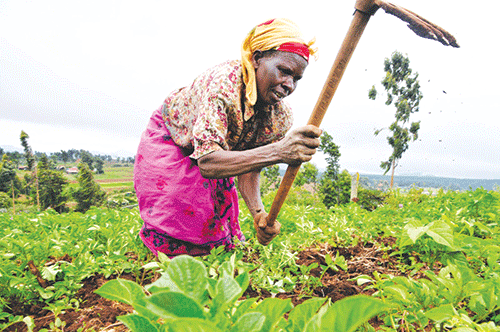Small-scale young farmers, especially those in deep rural areas, will be some of the biggest beneficiaries of Agribank and Germany’s Kreditanstalt für Wiederaufbau (KfW) Development Bank’s N$400 million concessional loan agreement.
Agribank and KfW recently announced reaching a N$400 million concessional loan agreement, which aims to empower farmers running enterprises in communal and commercial areas; but special emphasis will be placed on young small-scale farmers in rural setups.
“Agribank will lend funds to the target group of small-scale farmers as well as the MSMEs in primary agriculture and agro-processing sectors. With access to need-based financial products, the target group will be empowered to use funds to expand and develop their agriculture or food processing activities, thereby generating additional income and increasing food production and income in Namibia,” the two financial institutions said in a joint press statement.
During the signing ceremony, the Head of Development Cooperation at the German Embassy, Ulrike Metzger said it is known that there is a lack of access to credit financing in rural areas, especially for young farmers, women, and farmers on communal areas.
She said this prevents necessary investments to increase productivity and secure income for rural families.
“Commercial banks can only grant loans with land titles as collateral, which cannot be presented on communal land,” said Metzger.
The latest agreement also aims to promote the establishment of productive and resource-conserving agriculture for sustainability reasons.
Agribank CEO Raphael Karuaihe said the agreement marks a momentous occasion and symbolises a significant chapter in the bank’s commitment to sustainable and long-term funding for its lending activities.
“Our vision is to contribute not only to the financial well-being of our clients but also to the broader goal of environmentally conscious and sustainable practices in the agricultural sector,” said Karuaihe.
In Namibia, the agriculture sector continues to play a vital role in the development of the country’s economy. Around 70% of the country’s population depends directly or indirectly on agriculture as their main source of livelihood, while one-third of the workforce is employed in agricultural enterprises.
In communal areas in particular, agricultural production is still largely characterised by subsistence farming with low crop yields, a high dependency on rainfall, limited water access, significant post-harvest losses, and poor rangeland management practices.
The sector also lacks processing capacities, and marketing opportunities for smallholder farmers in rural areas are limited.
-ohembapu@nepc.com.na



